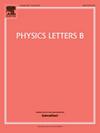非高斯统计中黑洞熵的贝肯斯坦界
IF 4.3
2区 物理与天体物理
Q1 ASTRONOMY & ASTROPHYSICS
引用次数: 0
摘要
贝肯斯坦界是受黑洞物理学启发,在广义热力学第二定律的背景下,将物理系统的熵增长限制在量子水平。我们首先证明,由于相关指标Δ、q和κ的存在,当非高斯统计量Barrow、Tsallis和Kaniadakis描述史瓦西黑洞的熵时,违反了标准Bekenstein界。然后,通过将GUP效应加入到Bekenstein界中,我们发现,通过熵指标与GUP参数β之间的可能联系,在上述熵的范围内,广义界是满足的。本文章由计算机程序翻译,如有差异,请以英文原文为准。
Bekenstein bound on black hole entropy in non-Gaussian statistics
The Bekenstein bound, inspired by the physics of black holes, is introduced to constrain the entropy growth of a physical system down to the quantum level in the context of a generalized second law of thermodynamics. We first show that the standard Bekenstein bound is violated when the entropy of a Schwarzschild black hole is described in non-Gaussian statistics Barrow, Tsallis, and Kaniadakis due to the presence of the related indices Δ, q and κ, respectively. Then, by adding the GUP effects into the Bekenstein bound, we find that the generalized bound is satisfied in the context of the mentioned entropies through a possible connection between the entropies indices and the GUP parameter β.
求助全文
通过发布文献求助,成功后即可免费获取论文全文。
去求助
来源期刊

Physics Letters B
物理-物理:综合
CiteScore
9.10
自引率
6.80%
发文量
647
审稿时长
3 months
期刊介绍:
Physics Letters B ensures the rapid publication of important new results in particle physics, nuclear physics and cosmology. Specialized editors are responsible for contributions in experimental nuclear physics, theoretical nuclear physics, experimental high-energy physics, theoretical high-energy physics, and astrophysics.
 求助内容:
求助内容: 应助结果提醒方式:
应助结果提醒方式:


